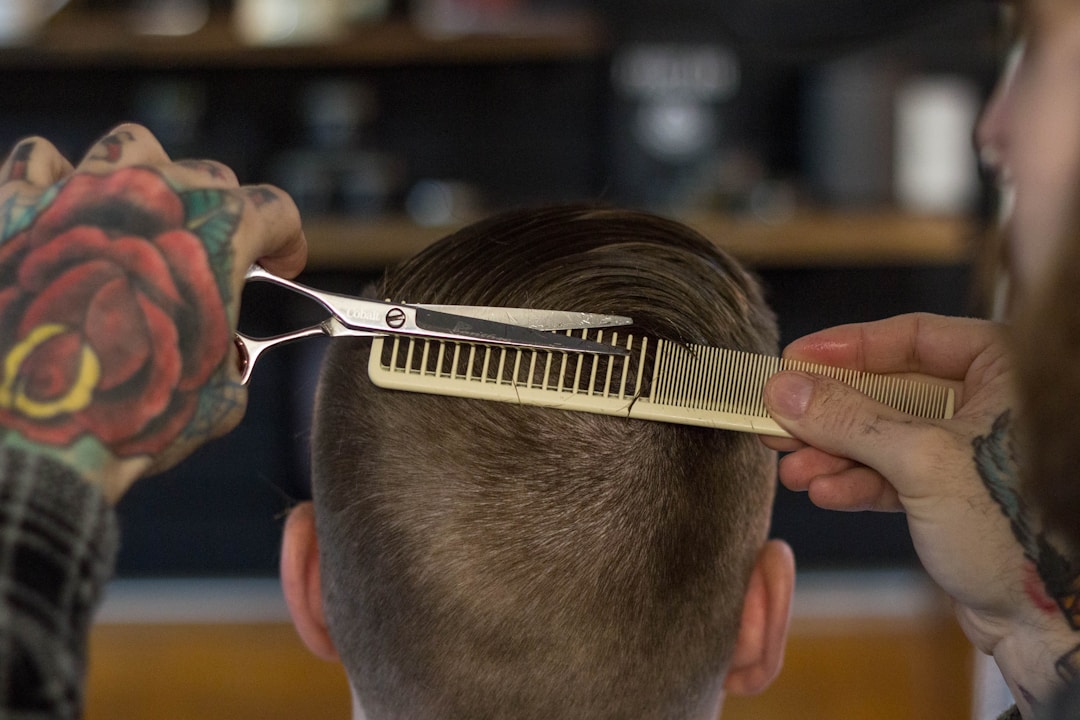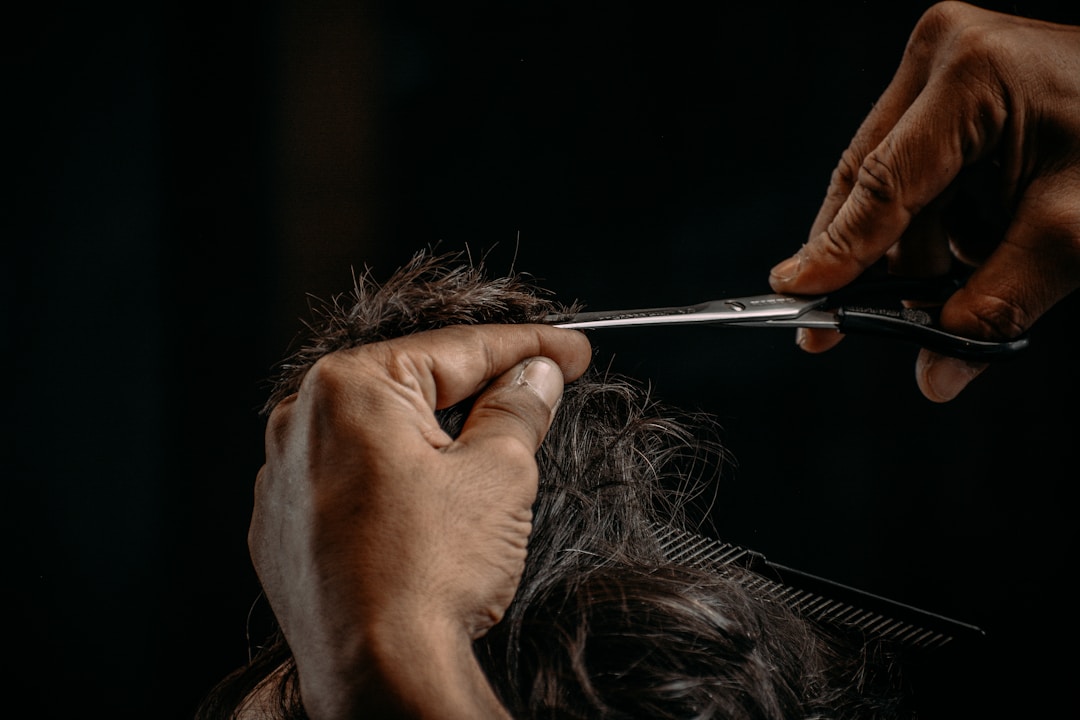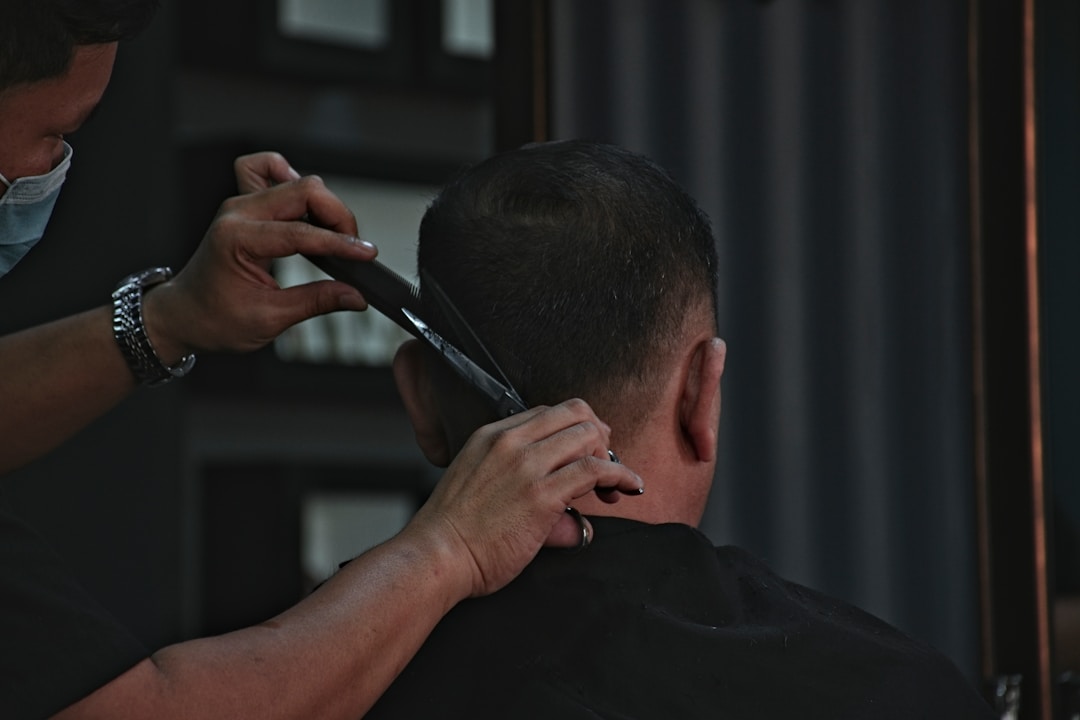Mastering Advanced Taper Fade Methods
Advanced taper fade methods represent the pinnacle of barbering artistry, requiring years of dedicated practice, technical mastery, and artistic visio...

Professional barbering tools showcasing advanced taper fade cutting techniques and precision methods
Mastering Advanced Taper Fade Methods
Advanced taper fade methods represent the pinnacle of barbering artistry, requiring years of dedicated practice, technical mastery, and artistic vision. At DIDA NYC Hair Studio in Queens, our master barbers have perfected these sophisticated techniques that improve taper fade execution from competent to exceptional, delivering results that demonstrate true craftsmanship across Rego Park, Forest Hills, and surrounding neighborhoods.
These advanced methods go beyond basic cutting techniques, incorporating complex blending strategies, precision tool work, and innovative approaches that create seamless, professional-grade taper fades. Understanding and mastering these methods separates expert barbers from practitioners who merely execute basic fades.
Advanced Clipper Techniques and Mastery
Multi-Directional Cutting Strategies
Advanced taper fade execution utilizes sophisticated clipper movement patterns that create superior blending and natural appearance:
Directional Cutting Patterns
- Cross-grain cutting: Working against natural growth patterns for enhanced blending
- Circular motions: Creating smooth transitions through curved movements
- Angular approaches: Utilizing multiple cutting angles for dimensional results
- Overlay techniques: Strategic overlapping patterns for seamless integration
- Contour following: Adapting to head shape for natural appearance
Advanced Guard Manipulation Techniques
Expert taper fade creation employs sophisticated guard usage that goes beyond basic progressive cutting:
Micro-Progressive Systems
- Half-guard intervals: Using intermediate lengths between standard guards
- Lever adjustments: Precise micro-adjustments for subtle transitions
- Custom guard combinations: Creating unique length progressions
- Transitional blending: Overlapping guard zones for seamless results
Open-Close Blade Techniques
Advanced practitioners master the art of blade lever manipulation for precise control:
- Progressive opening: Gradual blade adjustment during cutting
- Dynamic closure: Real-time length modification
- Feathering technique: Light touch blending with blade manipulation
- Pressure variation: Combining blade position with cutting pressure
Precision Scissor-Over-Comb Mastery
Advanced Comb Work Techniques
Master-level scissor-over-comb work requires sophisticated comb handling and positioning:
Comb Positioning Excellence
- Dynamic angle adjustments
- Tension variation control
- Smooth, consistent movement
- Precise guide line following
Advanced Scissor Control
- Variable pressure application
- Blade angle optimization
- Rhythm and timing mastery
- Precision cutting motions
Graduated Length Control Systems
Advanced practitioners employ sophisticated length control methods for perfect graduation:
- Mathematical progression: Calculated length reductions for optimal transitions
- Curve following: Adapting to natural head contours
- Tension mapping: Strategic hair lift patterns for consistent results
- Reference point systems: Multiple guide points for accuracy maintenance
Advanced Blending and Integration Techniques
Seamless Transition Mastery
Creating invisible transitions requires advanced understanding of hair behavior and cutting physics:
Micro-Blending Techniques
- Feathering methods: Ultra-light touch techniques for natural transitions
- Cross-sectional blending: Working perpendicular to growth patterns
- Layered integration: Multiple cutting passes for complex blending
- Texture variation: Incorporating natural hair characteristics
Advanced Elimination Techniques
Expert methods for eliminating visible lines and creating perfect transitions:
- Line dissolution: Strategic cutting to eliminate harsh transitions
- Gradient smoothing: Progressive length refinement
- Shadow creation: Subtle depth variation for dimensional appeal
- Organic integration: Natural-looking transition establishment
Complex Hair Pattern Navigation
Advanced taper fade methods must accommodate challenging hair growth patterns:
Difficult Growth Pattern Solutions
- Double crown management: Specialized techniques for conflicting growth directions
- Cowlick integration: Working with natural hair whorls and patterns
- Directional variation: Adapting cutting approach to hair behavior
- Tension compensation: Adjusting technique for unusual growth angles
- Custom blending: Individualized approaches for unique patterns

Expert barber demonstrating advanced scissors-over-comb techniques for seamless taper fade integration
Advanced Tool Integration and Techniques
Multi-Tool Synthesis
Expert taper fade execution seamlessly integrates multiple tools for optimal results:
Clipper-Scissor Coordination
- Strategic tool selection: Choosing optimal tools for specific areas
- Transition management: Smooth switching between cutting methods
- Complementary techniques: Using tools to improve each other's effects
- Efficiency optimization: Minimizing tool changes while maximizing results
Razor Integration Techniques
Advanced practitioners incorporate razor work for enhanced texture and finish:
- Edge refinement: Ultra-clean perimeter definition
- Texture enhancement: Natural movement and dimension creation
- Blending assistance: Softening transitions with razor techniques
- Detail finishing: Precision work in challenging areas
Specialized Equipment Applications
Advanced methods utilize specialized tools for superior results:
- Professional trimmer work: Precision detail cutting and edge definition
- Texturizing shear applications: Dimensional enhancement and softening
- Thinning technique integration: Bulk reduction and natural appearance
- Specialized comb usage: Custom combs for specific cutting techniques
Advanced Hair Type Specialization
Coarse Hair Advanced Methods
Coarse hair requires specialized advanced techniques for optimal taper fade results:
Cutting Adaptations
- Increased pressure techniques: Compensating for hair resistance
- Extended blending zones: Longer transition areas for natural appearance
- Multiple pass systems: Gradual length reduction for smooth results
- Texture management: Controlling coarse hair characteristics
Fine Hair Precision Methods
Fine hair demands delicate advanced techniques to avoid damage and ensure proper appearance:
- Light touch techniques: Minimal pressure application for gentle cutting
- Sharp tool requirements: Ultra-sharp blades for clean cuts
- Density considerations: Working with limited hair volume
- Styling integration: Cutting to improve fine hair appearance
Curly Hair Advanced Approaches
Curly hair presents unique challenges requiring specialized advanced methods:
Specialized Curly Hair Techniques
- Dry cutting mastery: Advanced techniques for natural state cutting
- Curl pattern analysis: Understanding and working with individual curl characteristics
- Shrinkage compensation: Advanced planning for curl contraction
- Dimensional cutting: Creating depth and movement in curly textures
- Spring-back management: Accounting for curl memory and elasticity
Advanced Consultation and Customization
Complete Assessment Protocols
Advanced taper fade methods begin with sophisticated consultation techniques:
Multi-Faceted Analysis
- Anatomical assessment: Detailed head shape and bone structure analysis
- Hair characteristic evaluation: Complete texture, density, and growth pattern analysis
- Lifestyle integration: Advanced consideration of client needs and preferences
- Style compatibility: Expert matching of technique to desired outcome
Predictive Cutting Methods
Advanced practitioners employ predictive techniques to anticipate results:
- Growth pattern prediction: Anticipating how the cut will evolve
- Styling behavior analysis: Predicting daily styling characteristics
- Maintenance scheduling: Advanced planning for optimal appearance longevity
- Adaptation strategies: Preparing for style evolution and changes
Advanced Quality Control and Refinement
Multi-Stage Inspection Protocols
Advanced methods include sophisticated quality control procedures:
Complete Quality Assessment
- Initial evaluation: Assessment after primary cutting phase
- Transition analysis: Detailed examination of blend quality
- Symmetry verification: Multi-angle balance confirmation
- Edge precision review: Perimeter quality assessment
- Final inspection: Complete quality verification before styling
Advanced Correction Techniques
Master barbers employ sophisticated methods for addressing imperfections:
- Micro-corrections: Minute adjustments for perfection
- Selective refinement: Targeted improvements in specific areas
- Progressive enhancement: Gradual perfection through multiple techniques
- Adaptive solutions: Creative problem-solving for unique challenges
Advanced Styling Integration
Cut-to-Style Coordination
Advanced methods incorporate styling considerations into the cutting process:
Styling-Informed Cutting
- Product behavior anticipation: Cutting to optimize product performance
- Styling technique integration: Incorporating intended styling methods
- Texture creation: Advanced cutting for enhanced styling possibilities
- Movement facilitation: Cutting to encourage natural hair behavior
Advanced Product Application Techniques
Expert styling methods that maximize advanced taper fade results:
- Sectional product application: Targeted product placement for optimal results
- Layered product systems: Multiple products for complex styling needs
- Professional finishing techniques: Expert methods for final presentation
- Longevity optimization: Techniques for extended style maintenance
Innovation and Technique Evolution
Emerging Advanced Methods
The field of advanced taper fade methods continues to evolve with new techniques:
- Technology integration: Incorporating modern tools and techniques
- Precision enhancements: New methods for increased accuracy
- Efficiency improvements: Advanced techniques for time optimization
- Quality advancement: Continuous improvement in result standards
Continuous Skill Development
Advanced practitioners engage in ongoing education and skill refinement:
- Master class participation: Advanced education in cutting techniques
- Peer collaboration: Learning from other advanced practitioners
- Technique experimentation: Developing and refining new methods
- Industry trend integration: Incorporating evolving standards and techniques
Troubleshooting Advanced Challenges
Complex Problem Resolution
Advanced methods include sophisticated approaches to challenging situations:
Common Advanced Challenges
- Asymmetrical head shapes
- Multiple growth pattern conflicts
- Previous cut corrections
- Extreme hair texture variations
Advanced Solutions
- Compensatory cutting techniques
- Strategic length placement
- Creative blending approaches
- Customized tool selection
Professional Development in Advanced Methods
Mastery Achievement Pathways
Developing advanced taper fade methods requires dedicated practice and education:
- Foundational mastery: Perfect execution of basic techniques
- Advanced training: Specialized education in complex methods
- Practice dedication: Consistent skill development and refinement
- Mentorship engagement: Learning from master practitioners
- Continuous improvement: Ongoing skill advancement and innovation

State-of-the-art barbershop environment where advanced taper fade methods deliver exceptional results for Queens clients
The DIDA NYC Hair Studio Advanced Advantage
Master-Level Experience
Our team at DIDA NYC Hair Studio represents the highest level of advanced taper fade experience:
- Advanced certification: Specialized training in complex cutting methods
- Years of experience: Extensive practice in advanced techniques
- Continuous education: Ongoing development in cutting-edge methods
- Innovation leadership: Development and refinement of advanced techniques
- Artistic excellence: Creative approach to technical mastery
State-of-the-Art Equipment
Our Queens location features the finest professional equipment for advanced methods:
- Premium professional-grade cutting tools
- Specialized equipment for advanced techniques
- Optimal workspace design for precision work
- Complete tool selection for all advanced methods
- Regular equipment maintenance and upgrades
Advanced Technique Comparison Guide
| Advanced Method | Primary Application | Mastery Level | Result Quality |
|---|---|---|---|
| Multi-Directional Cutting | Complex blending, seamless transitions | Expert | Superior |
| Advanced Guard Manipulation | Precise length control, custom gradients | Master | Exceptional |
| Texture Integration | Natural blending, dimensional appearance | Advanced | Excellent |
| Architectural Precision | Geometric accuracy, sharp definition | Master | Superior |
Advanced Taper Fade Maintenance Timeline
Days 1-10: Advanced Precision Visible
- • Advanced techniques create flawless, undetectable transitions
- • Taper fade demonstrates master-level craftsmanship
- • Action: Enjoy the superior quality of expert-level work
- • Benefit: Advanced methods create longer-lasting results
Days 11-21: Professional Excellence Maintained
- • Expert blending techniques ensure graceful evolution
- • Taper fade maintains professional appearance longer than standard cuts
- • Action: Standard styling routine preserves advanced work
- • Note: Superior technique extends optimal appearance window significantly
Days 22-28: Gradual Transition Phase
- • Advanced taper still looks professionally maintained
- • Expert methods create natural grow-out patterns
- • Action: Schedule maintenance appointment for restoration
- • Tip: Advanced techniques mean better appearance between cuts
Days 29+: Professional Refresh Recommended
- • Time to restore advanced precision and expert craftsmanship
- • Visit DIDA NYC Hair Studio for master-level touch-up
- • Action: Book with experienced barber for consistency
- • Benefit: Regular expert maintenance delivers best long-term value
Professional Products for Advanced Taper Fades
Professional-Grade Styling Cream
Purpose: Versatile styling with natural hold and flexibility
Application: Work through towel-dried hair for optimal control
Why Essential: Complements advanced taper structure, provides all-day hold
Expert-Level Pomade
Purpose: Polished finish with strong hold for professional styles
Application: Apply to dry hair for maximum control and shine
Why Essential: Perfect for showcasing advanced taper precision
Professional Volumizing Powder
Purpose: Adds lift and texture without weight
Application: Sprinkle at roots, work through with fingers
Why Essential: Enhances advanced taper dimension and structure
Professional Scalp Treatment
Purpose: Maintains optimal scalp health in tapered areas
Application: Apply daily to shorter sections
Why Essential: Advanced tapers require specialized scalp care
Master-Grade Shampoo System
Purpose: Professional cleansing preserves advanced cut quality
Application: Use 2-3 times weekly with conditioner
Why Essential: Expert products maintain expert cuts longer
Precision Edge Gel
Purpose: Maintains clean taper lines between professional visits
Application: Apply to edges and hairline daily
Why Essential: Extends advanced taper appearance, maximizes investment
Advanced Taper Fade Technique FAQ
Experience Advanced Taper Fade Excellence
Ready to experience the difference that advanced taper fade methods can make? Visit DIDA NYC Hair Studio in Queens and discover why our sophisticated fade techniques and master-level experience consistently deliver exceptional results that represent the pinnacle of barbering artistry. Browse all our premium services.
Book Your Expert Consultation
Ready to experience professional barbering excellence? Our expert barbers in Queens are ready to create the perfect cut that enhances your style and exceeds your expectations.
Contact Information
Phone: (718) 785-3038
Address: 92-29 Queens Blvd CU-6, Rego Park, NY 11374
Business Hours
Mon-Wed: 9:00 AM - 7:00 PM
Thursday: 9:00 AM - 9:00 PM
Friday: 9:00 AM - 5:00 PM
Saturday: 9:00 AM - 5:00 PM
Sunday: 9:00 AM - 5:00 PM